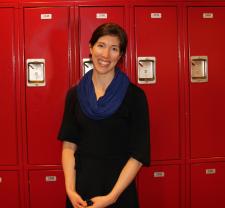Anna Takahashi, Eastside College Preparatory School
Posted on Mon, 05/12/2014 - 12:41
Located just north of the affluent town that is home to Stanford University, East Palo Alto has had a history of crime and violence and Silicon Valley's boom economy has largely bypassed the community and the families of the Latino, African American and Pacific Islander students who reside there. Today, the dropout rate for students from East Palo Alto is 65%.
In 1991, a Stanford student started an after-school basketball program for East Palo Alto kids in grades 4 through 8, linking participation with attendance at a daily study hall. But he soon realized it wasn't enough for these students, who, after eighth grade, would be bused 20 miles away to the nearest high school. So in 1996 that Stanford student, Chris Bischof, founded Eastside College Preparatory School, private school with an intensive, college-prep curriculum.
With an initial class of eight students, at one point, Bischof, who is today Eastside's principal, was using park benches in a muddy lot as a classroom. Today, more than 300 students enrolled in grades 6 through 12 attend school on a full built-out campus that includes boarding facilities for more than 100 students.













